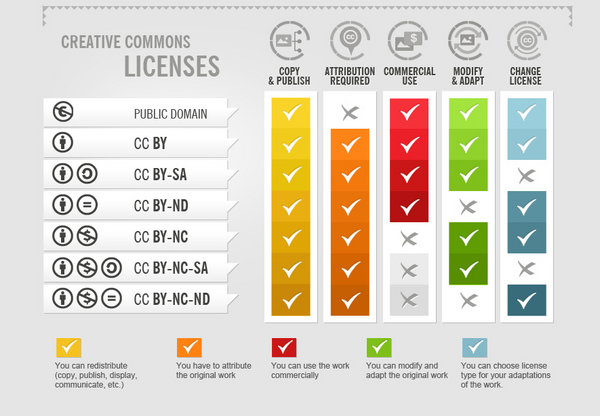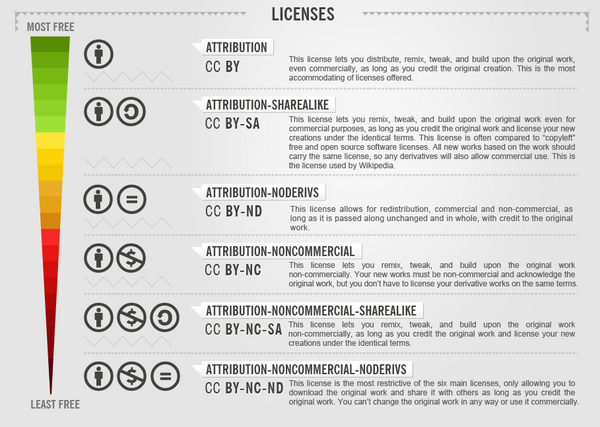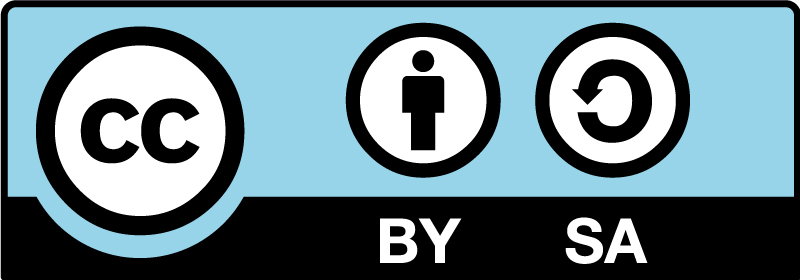- What is Creative Commons?
- License Terms
- Attributing Creative Commons Materials
- Finding and Using Creative Commons Materials
- Creative Commons FAQs
- Resources
What is Creative Commons?
When an author creates a work, Canadian law automatically grants them full “copyright” over their work. This means that nobody may copy their work or make changes to it, except with the author’s express permission, or in accordance with the user rights granted by the Copyright Act (e.g., fair dealing). Put another way, if you want to use a work in way that doesn’t qualify as a user right, you can only use the work as permitted by the copyright owner. The granting of permission is referred to as “licensing.” Some copyright holders restrict all rights to their work, and so you have to ask their permission to use their work. Others, however, proactively offer their work to the public on standard terms that allow anyone to use their work so long as certain terms and restrictions are complied with. Creative Commons licenses are a prominent example of this proactive licensing.
Creative Commons is a non-profit organization whose mandate is to make it easier for creators to share their work and/or build upon the works of others consistent with the rules of copyright. They have created standard, easy to use and understand copyright licenses that anybody can apply to their work to allow others to share, remix, or use the work without having to contact the copyright owner to ask for permission. There are several Creative Commons licenses, each with a different level of use restrictions.
Creative Commons licenses are not an alternative or exception to copyright, they are one way for copyright owners to distribute their work within the copyright framework.
This video provides a basic introduction to Creative Commons:
Wanna Work Together by the Creative Commons Organization and licensed under a Creative Commons Attribution (CC BY) license
License Terms
Creators or copyright holders who wish to apply a Creative Commons license to their work can choose to allow their work to be copied and reused with any one or more restrictions, or certain combinations of restrictions. The four restrictions are:
| Condition | Image | Description |
|---|---|---|
| Attribution |  |
You must give appropriate credit, provide a link to the license, and indicate if changes were made. You may do so in any reasonable manner, but not in any way that suggests the licensor endorses you or your use.[1]. |
| Non Commercial |  |
You may not use the material for commercial purposes.[2] |
| Share Alike |  |
If you remix, transform, or build upon the material, you must distribute your contributions under the same license as the original.[3] |
| No Derivatives |  |
If you remix, transform, or build upon the material, you may not distribute the modified material.[4] |
References:
- ↑ Creative Commons Attribution 4.0 International License http://creativecommons.org/licenses/by/4.0/
- ↑ Creative Commons Attribution-Non-Commercial 4.0 International License https://creativecommons.org/licenses/by-nc/4.0/
- ↑ Creative Commons Attribution-NoDerivatives 4.0 International License http://creativecommons.org/licenses/by-nd/4.0/
- ↑ Creative Commons Attribution-NonCommercial 4.0 International License http://creativecommons.org/licenses/by-nc/4.0/
Understanding the Different Creative Commons Licenses
Creative Commons offers six different licenses that allow copyright holders to apply different restrictions to how their work may be reused. When using a specific CC-licensed work, it is important to pay attention to the CC license and its restrictions. All Creative Commons licenses require attribution. The specific types of Creative Commons licenses are:
License Text and Icons by Creative Commons Organization and is licensed under a Creative Commons Attribution 4.0 License.
The following infographic provides an overview of the different license and their requirements:

Attributing Creative Commons Materials
All Creative Commons licenses require that users of the work attribute the creator. When providing attribution to a CC-licensed work, you should include:
For in-depth examples on citing Creative Commons images, please see the Creative Commons Image Citation Guide from the UBC Copyright Site. |
 |
Resources
Looking for more information on proper ways to attribute Creative Commons licensed resources? Check out these in-depth guides:
- How do I properly attribute a CC licensed work?: FAQ from Creative Commons
- Attributing Creative Commons Materials A 9-page guide from Creative Commons Australia on best practices for attribution of Creative Commons licensed materials.
- How to attribute Creative Commons licensed materials for Teachers and Students: a 7-page guide for Teachers and students from Creative Commons Australia on how to attribute Creative Commons materials.
Applying Creative Commons to Your Work
To apply a CC license to your work, you can use the “Choose a License” form on the CC website. This form helps you choose a license based on your preferences and then generates the appropriate text to apply to print works, as well as the HTML code to apply to online works.
Finding and Using Creative Commons Materials
The following is a list of websites and resources for finding Creative Commons materials. Please note that you should always look at the license for the specific resource you would like to use, and, if you cannot determine whether or not a work is covered by a CC license, then it’s likely protected by copyright.
Creative Commons Indexes
These sites provide meta-indexes of Creative Commons materials, including drawings, maps, music, painting, photography, sound, and video.
| Source | What is it? | Special Considerations |
|---|---|---|
| Creative Commons Search | If you’re looking for Creative Commons licensed materials, a good place to start is this tool. It searches a variety of sites, including Google Images, Wikimedia Commons, and SoundCloud for resources that are Creative-Commons licensed. See the How to find Creative Commons materials using the Creative Commons Search Portal Guide for more information. | Remember to verify that works are CC-licensed by following the links provided. |
| Creative Commons Content Directories | A directory of websites providing images, music, video, and text that use Creative Commons licensing. | n/a |
| Wikimedia Commons Free media resources | Extensive user-maintained indexes of sources that provide either Creative Commons or Public Domain Materials. | n/a |
| Google (Advanced Search) | You can find CC materials using an advanced Google search. This guide, “How to find Creative Commons materials using Google,” explains the process. | n/a |
| The Internet Archive | A digital library offering free universal access to books, movies, and music. Much of the material is in the public domain | n/a |
| Moving Image Archive | Contains over a million digital movies, which range from classic full-length films, to daily alternative news broadcasts, to cartoons and concerts. Many of these videos are available for free download. | n/a |
| Audio Archive | Contains over two hundred thousand free digital recordings ranging from alternative news programming, to Grateful Dead concerts, to Old Time Radio shows, to book and poetry readings, to original music uploaded by our users. | Many of these audios and MP3s are available for free download. |
| Ebook and Texts Archive | Contains a wide range of free fiction, popular books, children’s books, historical texts and academic books. | n/a |
| Find OER | An index of Open Education Resource (OER) repositories. | n/a |
| Citizen DJ |
Allows users to make music using free-to-use audio samples | Not all works are CC licensed. Refer to information on site for specific terms. |
Images
These websites provide images you can use freely as long as you abide by any terms of use provided by the owner of the content. Please see the Image Sources Tutorial for more resources and guidelines about using images in your works.
| Source | What is it? | Special Considerations |
|---|---|---|
| Flickr | Source of images and videos. Check The Commons to locate libraries and museums that share publicly held photography collections. | Make sure to select the Creative Commons option in the Advanced Search Settings to filter for images with a Creative Commons license. |
| Wikimedia Commons | Contains millions of freely usable images and media; and anyone can contribute. | n/a |
| Libraries and Archives Canada | Historical materials, including images, videos, and written texts, many of which are in the public domain. | Please see their copyright page for more info. |
| Images Canada | A gateway site to images of Canadian events, people, places and things. All images can be reproduced, in print and/or digital format, for the non-commercial purposes. | Please see their copyright page for more info. |
Music and Sound
These websites provide music you can use freely as long as you abide by any terms of use provided by the owner of the content.
| Source | What is it? | Special Considerations |
|---|---|---|
| ccMixter | An online collection of Creative Commons licensed music. | n/a |
| Free Music Archive | An online library of audio and video content that the public, including music fans, webcasters, and podcasters, may listen to, download, or stream for free. | n/a |
| Freesound | A collaborative database of Creative Commons Licensed audio snippets, samples, recordings, bleeps and sounds. | n/a |
| Opsound | Free music. Download, share, remix. | n/a |
| Petrucci Music Library | A wiki-based repository of musical scores available in the public domain. | n/a |
| Sound Transit | Field recordings and phonography from around the world. Free to share and reuse. | n/a |
Videos
These websites provide videos you can use freely as long as you abide by any terms of use provided by the owner of the content.
| Source | What is it? | Special Considerations |
|---|---|---|
| CC Wiki Films | Listing of Creative Commons licensed films. Includes documentaries and features. | n/a |
| Engage Media | Video sharing site focused on social justice issues in the Asia-Pacific area. | Unless otherwise noted, all videos are licensed CC BY 3.0 AU. |
| Internet Archive | Access to downloadable video, audio, text & multimedia in the public domain. | n/a |
| Prelinger Archives at the Internet Archive | A collection of ephemeral films. | These films are licensed under a Creative Commons Public Domain license, and may be freely downloaded, used or reproduced, in whole or in part. |
| Ted Talks | 1,900+ Ted Talk videos that can be freely shared for non-commercial purposes. A variety of languages and topics available. | Licensed under CC BY-NC-ND 3.0. |
| Vimeo Creative Commons Videos | Hundreds of thousands of CC-licensed videos on Vimeo. | Check each license to see what time of CC license has been applied. |
| YouTube (Advanced Search) | You can locate CC-licensed materials using filters in YouTube. The guide “How to find Creative Commons Material using YouTube” explains the process. | n/a |
Books and Textbooks
| Source | What is it? | Special Considerations |
|---|---|---|
| BC Open Textbook Project | Freely available open textbooks for courses in arts, sciences, humanities and business, supported by the B.C. government. | n/a |
| OpenStax | OpenStax free textbooks are developed and peer-reviewed by educators to ensure they are readable, accurate, and meet the scope and sequence requirements of courses. | n/a |
| Project Gutenberg | The full texts of close to 40,000 public domain books. | n/a |
Open Educational Resources
| Source | What is it? | Special Considerations |
|---|---|---|
| The Carnegie Mellon University Open Learning Initiative (OLI) | A resource that offers innovative, Creative Commons licensed, online courses. | n/a |
| Encyclopedia of Life | Free educational resources about science, nature, and “life on Earth.” Includes articles, podcasts, lesson plans, educational games, and more. | Must sign up for account. Most of the resources are CC-licensed. Check individual resource for information and see Copyright and Linking Policy. |
| MERLOT | An open online community of resources designed primarily for faculty, staff and students of higher education from around the world to share their learning materials and pedagogy. | Content is licensed under Creative Commons License Conditions. |
| MIT OpenCourseWare | A web-based publication of CC-licensed MIT campus based course content | n/a |
| Open Course Library | A collection of high quality, free-to-use courses that can be downloaded and used for teaching. | n/a |
| Open Education Europa | A portal offering European open educational resources in a variety of languages. Includes access to courses, MOOCs, OERs, and research on open education. | Unless otherwise noted, everything on the site is licensed CC BY 3.0. |
| Open Educational Resources Commons | A hub of OERs. Browse by topic/subject. Includes lesson plans, open textbooks, courses, and more. | CC-licensed unless otherwise noted. |
| Open Educational Resources Handbook for Educators | Designed to help educators find, use, develop and share Open Educational Resources to enhance their effectiveness online and in the classroom. | n/a |
| OpenStax CNX | Free educational materials. Includes courses, textbooks, and assignments. Filter by subject. | Content CC-licensed unless otherwise noted. |
| WikiEducator | A community project working collaboratively with the Free Culture Movement towards a free version of the education curriculum. | n/a |
Also see the Open Learning page on Open UBC .
UBC Resources
- Open UBC: An inventory of open communities and projects happening at UBC.
Open Access Journal Articles and Scholarly Materials
Open Access (OA) refers to scholarly literature that is freely available on the Internet. It is typically found in peer-reviewed Open Access Journals, or in Institutional Repositories, which act as archives of institutions’ scholarly output. For a list of Open Access resources, see Find Open Access Literature on UBC’s Scholarly Communications site.
Creative Commons FAQs
What is a license?
- In the copyright context, a license is another term for an agreement whereby the copyright owner grants someone else permission to use their work. A license need not be a formal looking document prepared by a lawyer and signed by the parties—a license can be contained in an email, or it can be permission given orally. Some licenses are given on a ‘unilateral’ basis, which means that the copyright owner grants everyone permission to use their work, so long as they agree to certain restrictions. This is what a copyright owner is doing when applying a CC license to their work.
If I put a CC license on my work, am I giving away my copyright?
- No. You retain your ownership of the copyright in your work. By granting any of the Creative Commons licenses, you’re give others permission to use your work on certain conditions. As the Creative Commons organization states: CC licenses are legal tools that copyright holders can use to offer certain usage rights to the public, while reserving other rights.
What can be licensed, and is there any cost involved?
- CC licenses can be applied to any work that is protected by copyright, including all original literary, artistic, dramatic and musical works, computer programs, translations and compilations of works, as well as sound recordings, performances and communication signals. This encompasses a wide range of things, ranging from books, articles, posters, manuals and graphs, to CDs, DVDs, software, databases and websites.
- Although CC licenses can theoretically be applied to software, the Creative Commons organization does not recommend it, and instead encourages software developers to use open licenses from the Free Software Foundation, such as the GNU General Public License. For more information, please see the CC FAQ on software.
- The Creative Commons organization supports the application of its licenses to data and databases that are protected by copyright. For more information, please see the CC FAQs on data.
Which is the best Creative Commons license?
- Choosing which Creative Commons license to use depends upon how the copyright owner of the work would like it to be reused, repurposed, or remixed. As a copyright owner, some of the questions you may wish to think about when choosing a Creative Commons License are:
- Am I ok with other people copying and distributing my content without permission?
- Am I ok with them changing and adapting the content? Will I allow remixing?
- Do I want to limit how others can release their remixes?
- Am I ok with other people making money out of their reuse of the work?
- Creative Commons has an online License Chooser tool that helps copyright holders walk through the process of understanding what license to use.
- The following chart provides more information on the different degrees of freedom and control that the licenses allow:

Do CC licenses apply internationally or are they location specific?
- All CC licenses are designed to apply internationally, although some have been adapted to reflect the official language and legal conventions of particular countries. According to the CC FAQ, “CC offers a core suite of six international copyright licenses (formerly called the ‘unported’),” and “also offers ported versions of its six, core licenses for many jurisdictions (usually jurisdiction = country, but not always).”
- This might seem complicated, but the take-home point is that both “[t]he ported licenses and the international licenses are all intended to be legally effective everywhere.” So, if the work you want to use is covered by a CC license that has been “ported” to a country other than Canada, you should feel free to use it.
- CC also has an FAQ for users who are wondering whether to choose an international or a ported license, if you are concerned about which to apply to your own work.
What is considered non-commercial? Is use by an educational institution considered to be non-commercial?
Creative Commons states that non-commercial (NC) licenses prohibit uses that are “primarily intended for or directed toward commercial advantage or monetary compensation.” Whether a use of a work is commercial will depend on the specifics of the situation and the intentions of the user, but not the type of user. Thus, it is possible that a non-profit, public universities’ use of a work may be considered commercial.
- If you have any questions about if you are appropriately complying with the terms of a CC licensed work, Copyright at UBC can provide guidance.
What is the difference between Creative Commons and Fair Dealing?
- Copyright exceptions (aka user rights), such as fair dealing allow the public to use copyrighted works in certain ways without the permission of the copyright owner. These exceptions are generally limited to using works for specific purposes, and you often need to meet various requirements in order to qualify for them.
- CC licenses, by contrast, are a form of permission granted by the copyright owner.
- CC licenses do not limit or restrict fair dealing or other exceptions in the Copyright Act, so you can use these exceptions to make use of a CC-licensed work, even if your intended use does not comply with the terms of the license. Equally, as long as you comply with the terms of the license, you can use a CC-licensed work without needed to meet the requirements for fair dealing or other copyright exceptions.
Can you apply a Creative Commons license to materials that also includes third-party copyrighted works (which have been used with permission)?
- If you want to apply a CC license to a work that includes other copyrighted works (which you’ve used with permission), then you need to be specific about what aspects of your work you are licensing.
You can do this by editing the CC legal notice that you apply to your work. The first step is to choose an appropriate license using CC’s Choose a License tool. Once you’ve selected a license, the tool will provide a general legal notice for you to apply to your work. For instance:
-
This work is licensed under a Creative Commons Attribution 4.0 International License.
If you’ve written an article that includes copyrighted images that you did not create yourself, then you might modify the above notice to read:
-
The text of this article is licensed under a Creative Commons Attribution 4.0 International License.
Alternately, if your article includes some images that you did create and others that you did not, then you could modify the notice to read:
-
Except where otherwise noted, this work is licensed under a Creative Commons Attribution 4.0 International License. [Image A] is copyrighted by [Person A] and used with permission. [Image B] is copyrighted by … [etc.]
Finally, if your work includes trademarks or other branding elements (such as the UBC logo), then you can add a statement at the end of the legal notice to indicate that the license does not apply to these elements. For instance:
-
This work is licensed under a Creative Commons Attribution 4.0 International License. The UBC logo is a registered trademark of the University of British Columbia. For guidelines on the permitted uses of UBC trademarks, please see http://universitycounsel.ubc.ca/university-trade-marks/.
The key thing to remember is that the terms of a CC legal notice can be amended as needed to clarify what aspects of a work the license applies to.
-
What happens if I use a CC work inappropriately?
- CC licenses only permit you to use the work if you comply with the terms. If you breach those terms, you could be held liable for breach of contract.
For this reason, it is very important to ensure that you read the terms of CC licenses carefully, and that you make every effort to comply with their conditions. If you have any questions or concerns about the terms of a CC license, or if you would like assistance with determining whether you are using a CC-licensed work appropriately, please contact the Copyright at UBC.
Where can I get more information or help on Creative Commons Licenses?
- Copyright at UBC can provide guidance on copyright and Creative Commons.
Resources
- Creative Commons Wiki: Documentation
- Foter Blog: How to Attribute Creative Commons Photos
- Creative Commons Information Pack — Although designed for Australian educators, this Creative Commons guide is useful for anyone interested in using and/or locating CC-licensed materials. Includes general information about CC; detailed guides on searching for CC-licensed materials using the Creative Commons Search Portal, Google, and Youtube; information on providing attribution for CC-licensed materials; how to label third party content in CC-licensed materials; and a quick reference guide to finding CC material.
